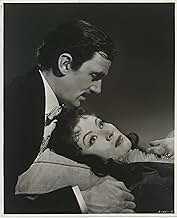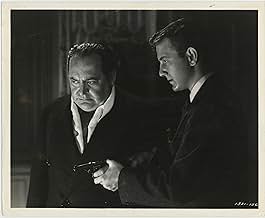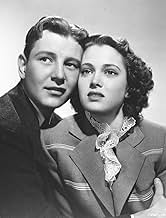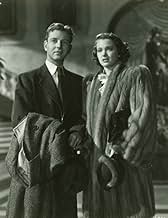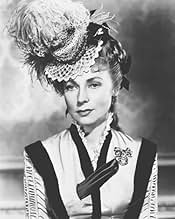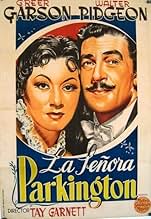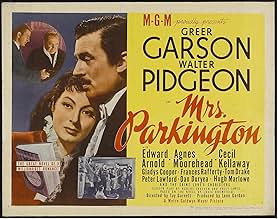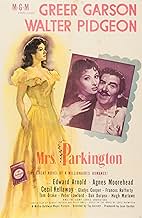IMDb रेटिंग
7.0/10
2 हज़ार
आपकी रेटिंग
अपनी भाषा में प्लॉट जोड़ेंA widowed matriarch reminisces about her family fortunes, including her romance with a financier/mine owner.A widowed matriarch reminisces about her family fortunes, including her romance with a financier/mine owner.A widowed matriarch reminisces about her family fortunes, including her romance with a financier/mine owner.
- 2 ऑस्कर के लिए नामांकित
- 4 जीत और कुल 3 नामांकन
St. Luke's Episcopal Church Choristers
- Carolers
- (as Saint Luke's Choristers)
फ़ीचर्ड समीक्षाएं
Greer Garson and Walter Pigeon were one of the great romantic teams of the 1940s but both were too old (particularly Pigeon) for their roles in this disappointing film version of the popular Louis Bromfield novel. Pigeon is simply miscast; he is too much the gentleman to ever be convincing as the boorish, philandering Major "Gus" Parkington. As his wife, Susie, Garson, wearing a dark wig (and looking rather like Yvonne DeCarlo), ages from a naive young woman to the crusty, 84 year old family matriarch. The characterization is never believable but her scenes as the elderly Mrs. Parkington are especially objectionable (she's too arch). Neither Garson or Pigeon is particularly well-aided by a meandering script that fails to adequately clarify the relationships among the family members or takes the time to develop the various characters. Consequently, one simply doesn't care what happens to the members of the Parkington dynasty. The supporting cast...among them, Edward Arnold, Lee Patrick, Dan Duryea, Cecil Kellaway, Frances Rafferty and Tom Drake...is competent but only Agnes Moorehead, in a rare sympathetic turn as Pigeon's ex-mistress, and Gladys Cooper, as Pigeon and Garson's dypsomaniacal daughter, manage to make a significant impression.
Greer Garson lived to be 91 years old, and she never looked as she did as the older Mrs. Parkington and the older Madame Curie - all white.
In this 1944 film, the Parkington family meets for Christmas, just before they all learn of a scandal which will impact the family fortune and the reputation of the family.
Thinking about her husband, Susie (Greer Garson), the matriarch, now 84, thinks back to meeting her husband Gus (Walter Pidgeon) at her family boarding house in Leaping Frog, Nevada. The major, as he was called, owned the mine where everyone worked.
Susie had always dreamed of being in high society, and she knew all about it and would fantasize about what it would be like. She gets her wish when, after the loss of her mother when the mine caves in, the Major and Susie marry and go to New York.
There she meets Aspasia (Agnes Moorhead), the Major's former mistress, who takes Susie in hand and helps her to buy clothes and learn the ways of society. Susie and the Major have children and encounter tragedy and separation. With the Major gone now, Susie reflects on how best to handle this situation by asking herself what the Major would do.
Really lovely film, with fine performances by Moorhead, Pidgeon, and of course, Garson. In the beginning she sports a black wig; I kind of missed, even in black and white, her flaming red hair. Strangely, Gladys Cooper plays Garson's daughter when Mrs. Parkington was 84. Cooper was 16 years older in reality.
In those days, it was more economical for studios to use actresses under contract than borrow someone (though lending actors out was incredibly lucrative). Possibly Cooper was under contract and available.
The film also features Edward Arnold, Dan Duryea, Lee Patrick, Tom Drake, Hugh Marlowe, Hans Conried, with Peter Lawford in a tiny role.
Good movie.
In this 1944 film, the Parkington family meets for Christmas, just before they all learn of a scandal which will impact the family fortune and the reputation of the family.
Thinking about her husband, Susie (Greer Garson), the matriarch, now 84, thinks back to meeting her husband Gus (Walter Pidgeon) at her family boarding house in Leaping Frog, Nevada. The major, as he was called, owned the mine where everyone worked.
Susie had always dreamed of being in high society, and she knew all about it and would fantasize about what it would be like. She gets her wish when, after the loss of her mother when the mine caves in, the Major and Susie marry and go to New York.
There she meets Aspasia (Agnes Moorhead), the Major's former mistress, who takes Susie in hand and helps her to buy clothes and learn the ways of society. Susie and the Major have children and encounter tragedy and separation. With the Major gone now, Susie reflects on how best to handle this situation by asking herself what the Major would do.
Really lovely film, with fine performances by Moorhead, Pidgeon, and of course, Garson. In the beginning she sports a black wig; I kind of missed, even in black and white, her flaming red hair. Strangely, Gladys Cooper plays Garson's daughter when Mrs. Parkington was 84. Cooper was 16 years older in reality.
In those days, it was more economical for studios to use actresses under contract than borrow someone (though lending actors out was incredibly lucrative). Possibly Cooper was under contract and available.
The film also features Edward Arnold, Dan Duryea, Lee Patrick, Tom Drake, Hugh Marlowe, Hans Conried, with Peter Lawford in a tiny role.
Good movie.
Greer Garson got an Oscar nomination for one of her best roles in Mrs. Parkington. Though the film is one that had her co-starring with her favorite leading man, the film is all Greer.
Like Maytime the film starts with Greer as the aged family matriarch of the Parkington family during Christmas of 1938. Her husband who died many years ago was Walter Pidgeon and the family has gathered once again. But there's a crisis brewing. Her grandson-in-law Edward Arnold has embezzled a ton of money in some bad market speculation. His daughter Frances Rafferty and Garson's great granddaughter additionally has a romantic problem, she's torn between her fiancé Tom Drake who is whistleblowing on Arnold and family loyalty.
During the evening Garson reminisces back to certain crisis times in her own marriage and it eventually tells her what she must do in this situation. I will say this about the Parkingtons, Garson's the genuine article, the rest of them are a spoiled and selfish lot, only Rafferty seems to have escaped the taint.
I have to say it was a little strange seeing the much older Gladys Cooper playing the daughter of the heavily made up Greer Garson, still both actresses are professional enough to make it convincing. There's a wonderful performance by Cecil Kellaway as the Prince of Wales during the Gay Nineties when Parkingtons are in Europe. Kellaway may be the Prince of Wales, but he proves to be real sharp in terms of human relations and delicately removes a bump in the road of the Parkington marriage.
Agnes Moorehead got a Supporting Actress nomination for Mrs. Parkington in the role of an impoverished French aristocrat who becomes friend and confidante of Garson. She gives Garson a lot of sage advice. She lost to Ethel Barrymore for None But The Lonely Heart and Garson lost her race for Best Actress to Ingrid Bergman in Gaslight.
Mrs. Parkington remains however one of MGM's best films of the Forties. The influence of Maytime and of Citizen Kane in the telling of the Parkington family story is obviously apparent. And the message about both inherited wealth and the damage that mere speculation without creating could have come from Wall Street. For Greer Garson and Walter Pidgeon fans a must.
Like Maytime the film starts with Greer as the aged family matriarch of the Parkington family during Christmas of 1938. Her husband who died many years ago was Walter Pidgeon and the family has gathered once again. But there's a crisis brewing. Her grandson-in-law Edward Arnold has embezzled a ton of money in some bad market speculation. His daughter Frances Rafferty and Garson's great granddaughter additionally has a romantic problem, she's torn between her fiancé Tom Drake who is whistleblowing on Arnold and family loyalty.
During the evening Garson reminisces back to certain crisis times in her own marriage and it eventually tells her what she must do in this situation. I will say this about the Parkingtons, Garson's the genuine article, the rest of them are a spoiled and selfish lot, only Rafferty seems to have escaped the taint.
I have to say it was a little strange seeing the much older Gladys Cooper playing the daughter of the heavily made up Greer Garson, still both actresses are professional enough to make it convincing. There's a wonderful performance by Cecil Kellaway as the Prince of Wales during the Gay Nineties when Parkingtons are in Europe. Kellaway may be the Prince of Wales, but he proves to be real sharp in terms of human relations and delicately removes a bump in the road of the Parkington marriage.
Agnes Moorehead got a Supporting Actress nomination for Mrs. Parkington in the role of an impoverished French aristocrat who becomes friend and confidante of Garson. She gives Garson a lot of sage advice. She lost to Ethel Barrymore for None But The Lonely Heart and Garson lost her race for Best Actress to Ingrid Bergman in Gaslight.
Mrs. Parkington remains however one of MGM's best films of the Forties. The influence of Maytime and of Citizen Kane in the telling of the Parkington family story is obviously apparent. And the message about both inherited wealth and the damage that mere speculation without creating could have come from Wall Street. For Greer Garson and Walter Pidgeon fans a must.
Oh, why couldn't this film have been longer? I was taken in from the very beginning and was fascinated watching the lives of the Parkingtons. Greer Garson was exceptional as we watched her age from a young lady to a family matriarch in her 80's. I must agree that the pairing of she and Walter Pidgeon was superb and Agnes Moorehead's performance was remarkable. Gladys Cooper always stands out in any cast and with costumes of such splendor and the storylines that ranged from tragic to tremendous, there was no way to lose with this movie. Perhaps now, I'll go purchase the novel and see if I can get any more from this tale that didn't make it to the big screen. As they always say, "the book was better than the movie". I intend to try and find out. I can hardly imagine it, but I can only hope to find more and more delight from the adventures of the Parkingtons. This was one of my favorites with the pairing of Garson and Pidgeon. It's a truly entertaining movie and I recommend it highly!
Greer Garson and Walter Pidgeon turn in fine performances here, in fact, they're as good here as in any of their films. Garson has long been a favorite of mine, and I particularly revere her performance in "Random Harvest". This film isn't quite that good, but it is a gem.
Of particular interest here are two very unusual performances by supporting actors. When I read, in advance, that Agnes Moorehead played a French socialite...well, I just couldn't see it. But, she was wonderful, and this is an Agnes Moorehead you've never seen before! And Cecil Kellaway as Edward, Prince of Wales...again, a very different performance, and so well done.
The story itself is interesting, with Garson as an old family institution reflecting on her life. If there's a criticism about this film, it's that Garson looks too young even in her elderly makeup. But, for much of the movie, she's her usual alluring self. Is it a sentimental melodrama? Yes. But a delightful one.
Of particular interest here are two very unusual performances by supporting actors. When I read, in advance, that Agnes Moorehead played a French socialite...well, I just couldn't see it. But, she was wonderful, and this is an Agnes Moorehead you've never seen before! And Cecil Kellaway as Edward, Prince of Wales...again, a very different performance, and so well done.
The story itself is interesting, with Garson as an old family institution reflecting on her life. If there's a criticism about this film, it's that Garson looks too young even in her elderly makeup. But, for much of the movie, she's her usual alluring self. Is it a sentimental melodrama? Yes. But a delightful one.
क्या आपको पता है
- ट्रिवियाUnusual for a film even today, the movie was shot in chronological order.
- गूफ़The gypsy fiddler plays Johann Strauss's "Roses from the South" on violin in a scene set in 1872, but that music was written in 1880.
- भाव
Susie 'Sparrow' Parkington: Why did you marry me?
Major Augustus Parkington: Life was too simple without you.
- इसके अलावा अन्य वर्जनIn the European released version, Cecil Kellaway was replaced by 'Hugo Haas' and the role was changed to "Balkan King." Also, Tala Birell's character was changed to simply "Countess" instead of "Lady Norah Ebbsworth." Three actors in casting call lists but who were not in the U.S. print (Ann Codee, George Davis and Frank Reicher may also have been in this version (see the trivia section.)
- कनेक्शनFeatured in Twenty Years After (1944)
- साउंडट्रैकI'll Take You Home Again, Kathleen
(1876) (uncredited)
Music by Thomas Payne Westendorf
Played extensively in the score, mostly as a love theme
टॉप पसंद
रेटिंग देने के लिए साइन-इन करें और वैयक्तिकृत सुझावों के लिए वॉचलिस्ट करें
- How long is Mrs. Parkington?Alexa द्वारा संचालित
विवरण
- रिलीज़ की तारीख़
- कंट्री ऑफ़ ओरिजिन
- भाषा
- इस रूप में भी जाना जाता है
- La señora Parkington
- फ़िल्माने की जगहें
- Morrison Ranch, Agoura, कैलिफोर्निया, संयुक्त राज्य अमेरिका(fox hunt sequence)
- उत्पादन कंपनी
- IMDbPro पर और कंपनी क्रेडिट देखें
- चलने की अवधि2 घंटे 4 मिनट
- रंग
- पक्ष अनुपात
- 1.37 : 1
इस पेज में योगदान दें
किसी बदलाव का सुझाव दें या अनुपलब्ध कॉन्टेंट जोड़ें



